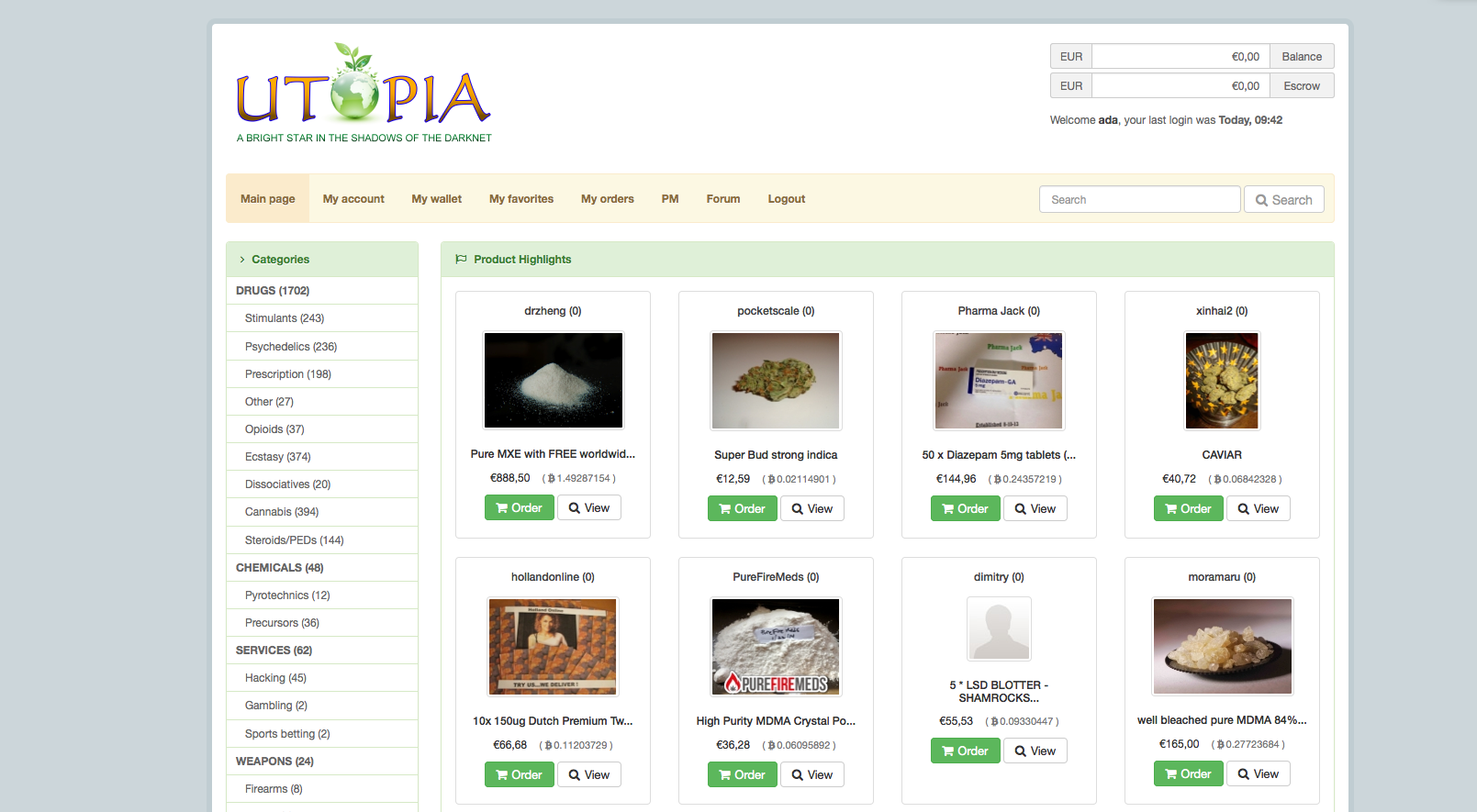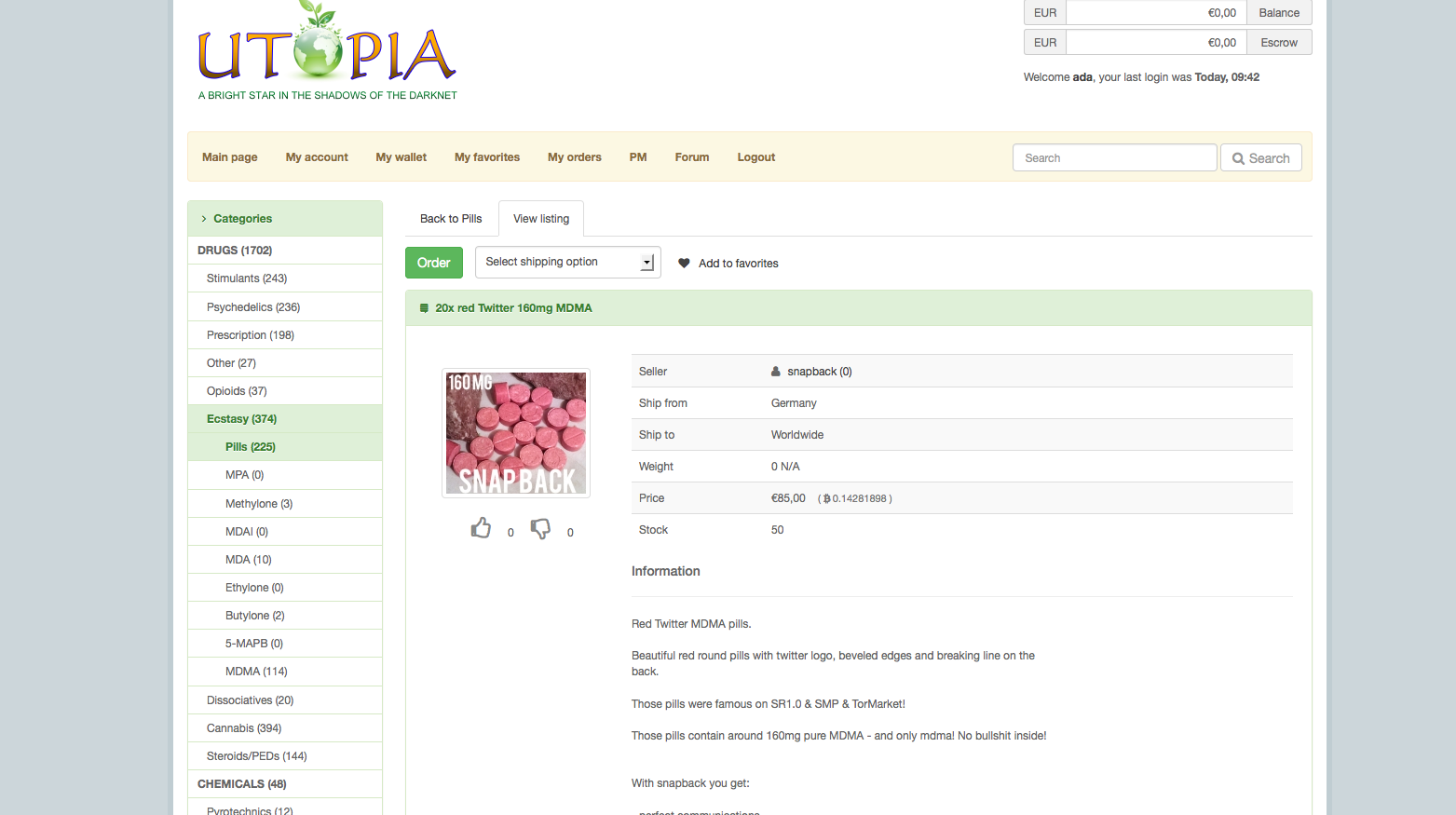The following article contains content and images that may be NSFW.
Since the fall of Silk Road, there has been no rest on the Deep Web. Some sites disappeared, others like were mothballed with the promise to reopen again. Considering the latest charges brought against the alleged Silk Road founder, Ross Ulbricht, who is now risking a potential minimum prison sentence of 30 years, times seem grim for the Internet’s black markets.
And yet, there early signs of progress and promise. A new drug market, called Utopia, opened this week. With a sleek design and a green earth as a symbol, it promises to be a “bright star in the shadows of the darknet.”

Screengrab via Utopia
In just a matter of days, the market has collected a staggering number of listings: 1700 in the Drug category; 62 under Service, which includes hacking and gambling; 24 in the Weapons section; and 88 in the Ebook category. Utopia’s forum, which has been online for a while on a separate address, counts over 3000 users and a growing number of posts and topics.
How is such rapid growth possible? The new bazaar appears to have strong connections with an old one, Black Market Reloaded (BMR). Some people from the BMR’s staff moved there, and the market has been developed “with some help and inspiration from Backopy,” wrote Swim, Utopia’s admin, in the same forum.

Screengrab via Utopia
Backopy, who is well-known and respected within the Deep Web community, is the founder of Black Market Reloaded, which appeared at one point to be the heir apparent to Silk Road. It had a turbulent end to 2013: first by having some of its code leaked, then by being hacked—although its vendors were refunded of eventual losses. After being briefly shut down and then opened again in October, it closed for good in December for security reasons, claiming it was not able to cope with the influx of new customers. Many old BMR vendors appeared to have moved to the new market.
“All BMR vendors names are protected on Utopia market and can only registrar (sic) if they confirm their PGP key,” explains one forum post. “Also the feedback reputation will be imported and available to keep doing business.” Utopia also promises to automatically encrypt users’ personal messages, and to add convenient search filters.
So is Utopia the new BMR? Apparently not. Backopy is still reportedly working on his own project for a new version of BMR. But it’s a promising sign for the future of the Deep Web.
In fact, there are a number of new marketplaces, each vying to capitalize on Silk Road’s disappearance. The site DeepDotWeb, a sort of TripAdvisor for the black markets, has reviewed around 15 of them. Here’s what you need to know.
Silk Road 2.0
The new version of the infamous bazaar, led by a new Dread Pirate Roberts, opened just a month after the original site was seized by the FBI; however, it has faced a lot of problems since its launch. Two of its alleged moderators, who had moved from the first Silk Road, have been arrested. At the same time, Dread Pirate Roberts temporarily disappeared, leaving his second-in-command, named Defcon, at the helm of the ship. Today, the site lists over 12,000 items.
Agora Market and Outlaw Market
Both of these markets are considered at least relatively stable. The Agora Market has a spartan layout, lists roughly 2,400 drug-related items, has got a popular Information category that includes hacking how-to guides, and a Counterfeit section that’s full of watches. The Outlaw Market shows a funny Old West-style design, and it takes a very international approach: Its interface can be configured to use different languages. Apparently, judging from its login page, it’s even looking for admins for different countries and regions.
The Blue Sky Marketplace and Pirate Market
Blue Sky Marketplace is small and drug-oriented (mainly selling cannabis) that kindly advises its visitors to disable Javascript in their Tor browser, in order to surf more safely. Pirate Market was formerly known as RoadSilk. It’s a niche market that trying to siphon off customers from larger enterprises. Apart from marketplaces, vendors’ shops also appear to be increasing, likely because some of Silk Road’s old top sellers have decided to start independent operations.
The WhiteRabbit Marketplace
The WhiteRabbit Marketplace is one of the more prominent markets operating with an I2P address, an anonymous overlay network, which is basically a network within a network. It provides strong anonymity and a distributed platform that’s meant to deflect attacks. For the paranoid types, there’s also The MarketPlace, which also has already created a considerable hub on Reddit.
Taken together, the Deep Web appears to be recovering in the wake of the Silk Road closure. There’s still cause for serious concern, obviously. These are illegal markets we’re talking about, where the risk of being scammed runs deep. Just consider the meteoric rise and fall of Atlantis, a marketplace that went so far as to publicize itself on YouTube, only to suddenly fold for “security reasons” suspiciously close to the feds’ seizing of Silk Road, or Sheep Marketplace, which shut down after a suspicious “hack” that stole at least 5,400 bitcoin, worth about $4.6 million at the time.
At least now customers know full well the risk of doing business in the Deep Web.
Illustration by Jason Reed




